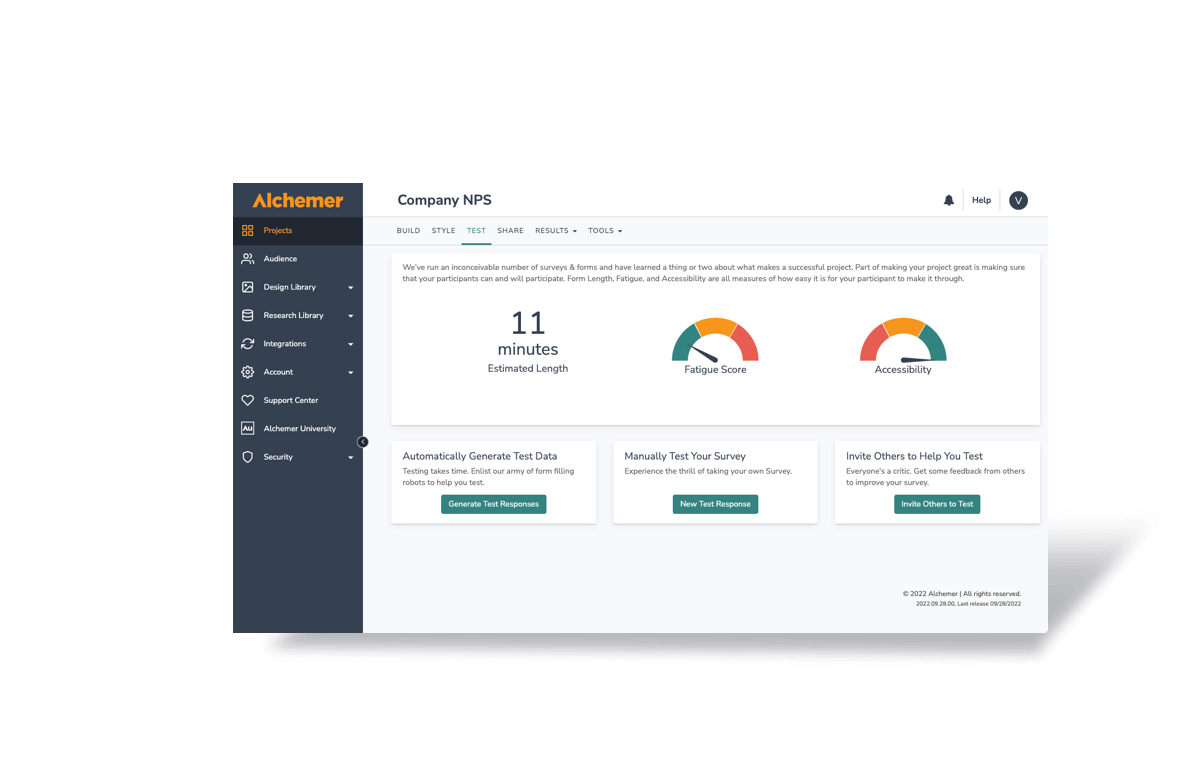Collecting Personal Information with Surveys Should Be Handled Delicately
Depending on the initiative that your survey project is supporting, it’s possible that you’ll want to collect some personal information (PI) from respondents.
In order to receive actionable data in an ethical manner, it’s essential to maintain the best practices outlined in this article while collecting PI.
The collection of any PI will need to be explicitly consented to by your survey respondents, and you will need to be compliant with the General Data Protection Regulation (GDPR) while collecting your data.
While the Alchemer platform provides the controls and capabilities necessary to aid in compliance, you will need to confirm with your own legal counsel to determine the business’ specific compliance and regulatory requirements.
Related: Alchemer’s Commitment to GDPR
Personal information is not the same as personally identifiable information.
PI includes gender, political views, income, religious affiliations, or even intimate matters like personal hygiene.
Personally identifiable information (PII) consists of any data that could be used to potentially identify a specific individual such as residential addresses, Social Security numbers, or banking information.
Note: This article does not cover how to go about collecting PII, rather it addresses how to collect information that some people may feel is personal in nature. Collecting this type information does not coincide with a security threat or a threat to your respondents’ privacy.
Researchers collecting PI must be cautious.
You’ll want to maintain a level of respect and ensure that you’re not making your survey respondents uncomfortable by asking them questions that they are unwilling to answer.
This often presents a difficult challenge, as researchers tend to be motivated to collect as many responses as possible to establish an actionable and statistically significant dataset.
If you do not go about your data collection delicately, however, you run the risk of survey respondents failing to complete your survey or providing untruthful responses that ultimately result in inaccurate and insignificant data because they are uncomfortable.
Related: When is a Sample Size Statistically Significant?
Strategies for collecting PI vary depending on the research goal.
Strategies for efficiently collecting PI using surveys vary depending on the nature of the information that you are seeking, and the objective of collecting PI.
The following resources can be leveraged to better understand how to best to write survey questions that ask for PI:
- How to Write Gender Questions for a Survey
- How to Write Better Demographic Survey Questions (With Examples)
Install a ready-to-use template right into your Alchemer account for gathering PI such as public opinion and demographic data:
Tips for Collecting PI with Surveys
Data security is always top-of-mind here at Alchemer. In order to provide only the best advice possible around this topic, we worked closely on this content with our in-house compliance and security expert.
Consider if PI is essential to your research.
First and foremost, if the PI for which you are asking does not directly support and impact your ultimate research objective and is not being used as a qualifying parameter, then there’s no need to ask sensitive questions. This is critical first step to take in order to determine if collecting PI is a crucial aspect of a successful research project.
Set the survey to be anonymous.
It’s common to require PI for research purposes, but it isn’t always essential to know exactly who that information is coming from.
By making survey responses anonymous and informing your respondents that you have done so before they start inputting their data, respondents are more likely to provide PI since they know it won’t be traced back to them.
As a general rule of thumb, making a survey anonymous often leads to survey respondents providing more truthful and honest responses.
Stress the importance of confidentiality in the survey instructions.
Prior to building the full question set in the survey, provide instructions on page one that highlight how important confidentiality and integrity are to your research.
While it may seem like an obvious tactic, simply explaining to your respondents how important confidentiality is can go a long way in terms of getting them to provide PI.
Ask less sensitive questions prior to asking for PI.
Asking simple, nonthreatening questions, non-PI data at the beginning of your survey is a great way to build trust with your respondents.
When respondents are first presented with non PI-related question sets, they are more likely to provide PI-related responses when they are included later in the survey.
Provide choices and answer options in your survey questions.
You’ll want to present your questions to your respondents as neutrally as possible. For example, avoid questions such as, “Do you exercise regularly?”
This question comes off as a bit judgmental, and it does not clarify what “regularly” refers to.
Instead, a better option would be to pose a question such as, “How often do you exercise?”
You could then provide some answer options such as “Once a week,” “Twice a week,” or “Never.” This removes the judgmental tone from the question and allows respondents to provide more accurate responses.
Always allow respondents to opt out.
Anytime you ask for PI in a survey, allow your respondents to opt out of answering PI-specific questions. Within Alchemer, you can also leverage the “required question” functionality which you can manually check on or off for each survey question.
Allowing respondents to opt out of individual questions allows them to respectfully communicate the message that, “I’m not comfortable answering this question, but I’d be happy to continue taking your survey.”
Collecting PI with Surveys Isn’t as Hard as it Seems
Oftentimes, researchers are so averse to asking for PI using surveys that they don’t end up receiving all of the data needed to reach the goal of the research project.
Don’t let the question set up deter you away from asking for PI. Once you get these compliance basics down, asking for PI in surveys is not any different than asking for other kinds of information. PI is extremely powerful data to leverage and use for many different studies.




